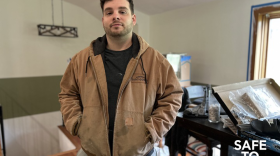The New Hampshire Supreme Court has ruled that people who have been exposed to toxic substances cannot try to recover the costs of medical testing from polluters if they’re not currently sick.
The ruling stems from a case still pending in a lower court, which was brought by people living near the Saint Gobain manufacturing facility in Merrimack who say they were exposed to PFOA, a PFAS chemical that may lead to increased risks of health problems. Among other requests, residents want the company to pay for medical monitoring for those potential illnesses.
That case is being argued in U.S. District Court in New Hampshire, before Judge Joseph Laplante. Laplante sent a question to the state’s Supreme Court for a ruling: When someone is wrongfully exposed to a toxic substance in New Hampshire, can a polluter be forced to pay for the costs of the medical testing needed to monitor potential illnesses?
During oral arguments in the case last November, Saint Gobain lawyers argued that people need to have a present physical injury to be compensated for testing, and that allowing claims for medical monitoring would deviate from New Hampshire common law.
In a ruling issued this week, the Supreme Court agreed, saying people who have no present physical injury cannot make a claim for the costs of medical monitoring, even if they have an increased risk of future diseases.
States across the country have been split on whether to allow these kinds of lawsuits.
The Conservation Law Foundation filed an amicus brief in the case on behalf of organizations advocating for PFAS remediation and polluter responsibility. Heidi Trimarco, a lawyer with the foundation, likened the request for medical monitoring to X-rays for a broken arm, in the case of a car accident.
“The person at fault in the car accident should pay for that X-ray, even if it shows that you have a broken arm or not. So that the X-ray is the necessary medical test,” she said.
It’s not new to expect someone who hurts someone else to pay for medical tests the hurt person needs, Trimarco said.
In November’s oral arguments, lawyers for Saint Gobain pushed back on the X-ray example, saying the presence of cuts or bruises in that case shows a present injury.
The court’s ruling is broad, Trimarco said, and not just limited to this case. It means those who have been exposed to toxic substances will need to pay for their own medical monitoring, waiting until they potentially develop a disease to try to recover costs from the polluter
“This is a matter of basic fairness,” she said. “The polluter who puts a toxic substance into the environment and into people's water should be responsible, and held responsible, for the medical tests that are necessary as a result of the pollution.”
In 2020, Gov. Chris Sununu vetoed a bill that would have opened the door to medical monitoring claims in state courts. The Supreme Court cited that veto in their ruling.







